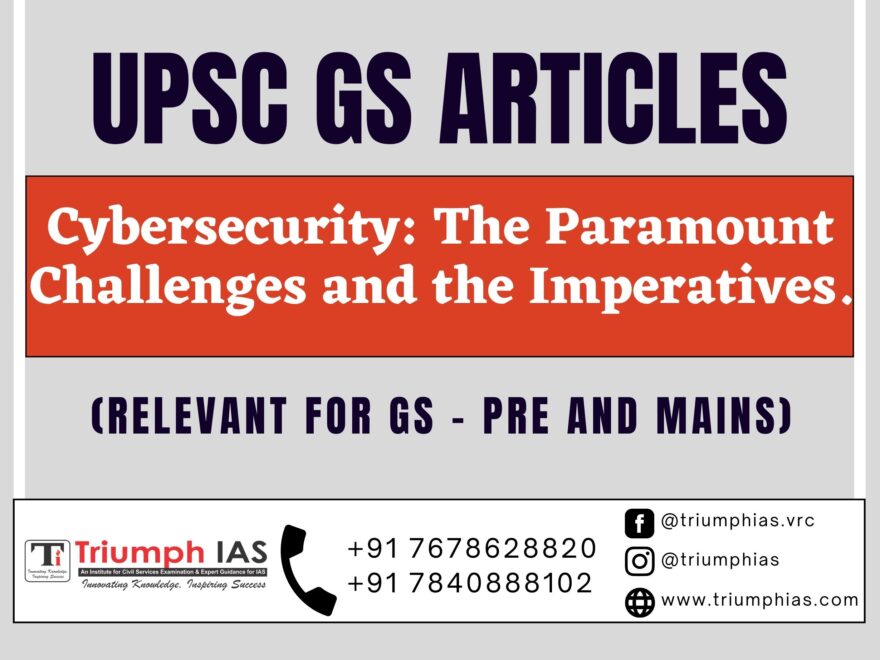Cybersecurity: The Paramount Challenges and the Imperatives.
(Relevant for GS – Pre and Mains)

As outlined in India’s Cyber Security Policy 2013, cyberspace is a multifaceted domain, encompassing human elements, software applications, and services, buttressed by a vast, worldwide array of information and communication technology apparatus and networks.
Historically, the interpretation of cyberspace was confined to three dimensions: the tangible/hardware, the cerebral/software, and the ethereal/data.
Cybersecurity:
Cybersecurity, synonymous with information technology security, refers to the arsenal of strategies deployed to safeguard computers, networks, programs, and data from unauthorized access or assaults aimed at exploiting cyber-physical systems and the pivotal information infrastructure.
Cyber-physical systems seamlessly amalgamate sensing, computation, control, and networking into physical assets and infrastructure, tethering them to the internet and facilitating intercommunication.
Exemplars of this include industrial control systems, water management systems, robotic systems, and the smart grid, among others.
As per the Information Technology Act of 2000, Critical Information Infrastructure is defined as a computer resource, the incapacitation or obliteration of which could inflict a crippling blow to national security, economic stability, public health, or safety.
Concerns Pivotal to Cybersecurity in India:
- Profit-Driven Infrastructure Mentality: Following liberalisation, sectors such as Information Technology (IT), electricity, and telecommunications have seen an influx of private sector investment. Yet, their lack of emphasis on readiness and recovery from cyber-attacks in their regulatory schemas is alarming.
- All operators prioritize profit, exhibiting reluctance to allocate resources to infrastructure that lacks profit-generating potential.
- The absence of a distinct procedural code for investigating cyber or computer-related offences is glaring.
- A majority of cybercrimes possess an international dimension. Gathering evidence from overseas jurisdictions is a complex and often protracted endeavour.
- Over the past few years, India has embarked on a journey of digital transformation, etching its mark prominently on the global stage.
- Cutting-edge technologies such as 5G and the Internet of Things (IoT) will augment the reach of the internet-connected ecosystem.
- As digitalisation continues to proliferate, a surge of invaluable consumer and citizen data will be digitised and transactions will likely transition online, thereby establishing India as fertile territory for potential hackers and cyber malefactors.
- Offences relating to cryptocurrency often go unreported as the capability to resolve such crimes remains insufficient.
- While most State cyber labs are adept at analysing hard disks and mobile phones, they await official recognition as ‘Examiners of Electronic Evidence’ by the central government. Until such accreditation is received, they cannot proffer expert insight on electronic data.
Strategies to Mitigate Cybersecurity Threats:
- The Centre and States must act in unison, architecting statutory guidelines to aid cybercrime investigations, while also allocating substantial funds to the creation of the much-needed cyber infrastructure.
- Establishing robust capacity to counteract cybercrime is paramount.
- This could be accomplished either by the establishment of an exclusive cyber police station in each district or range, or by ensuring the presence of technically proficient staff in every existing police station.
- A comprehensive approach to cyber conflict is crucial, be it in conducting cyber surveillance operations or in enhancing the countermeasures against cyber-attacks.
- Given that cyberspace has ascended to be the fourth policy domain for India, fortifying cybersecurity is a matter of utmost urgency.
Follow us :
-
https://www.instagram.com/triumphias
https://www.youtube.com/c/TriumphIAS
https://t.me/VikashRanjanSociology
Find More Blogs
Scope of the subject and comparison with other social sciences
Changing family structure in India Modernity and social changes in Europe
marriage types, monogamy, polygamy, polygyny, polyandry, group marriage, serial monogamy, non-serial monogamy, sororal polygyny, non-sororal polygyny, fraternal polyandry, non-fraternal polyandry, social institutions#Sociologyforupsc #sociologyforupscinhindi #sociologyforupscgs1 #sociologyforupscprelims #sociologyforupscinenglish #sociologyforupscmainsinhindi #sociologyforupscoptionalinhindi #sociologyforupscmains #sociologyforupscplaylist #sociologyforupsclecture1 #sociologyforupsccse #sociologyforupscoptional #syllabusofsociologyforupscoptional #bestbookforsociologyforupsc #sociologyoptionalforupscanswerwriting #sociologyoptionalforupscanukumari #sociologyoptionalforupscabhijeet #sociologyoptionalforupscanalysis #sociologyoptionalforupscalllectures #sociologysyllabusforupscanalysis

